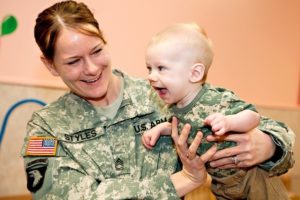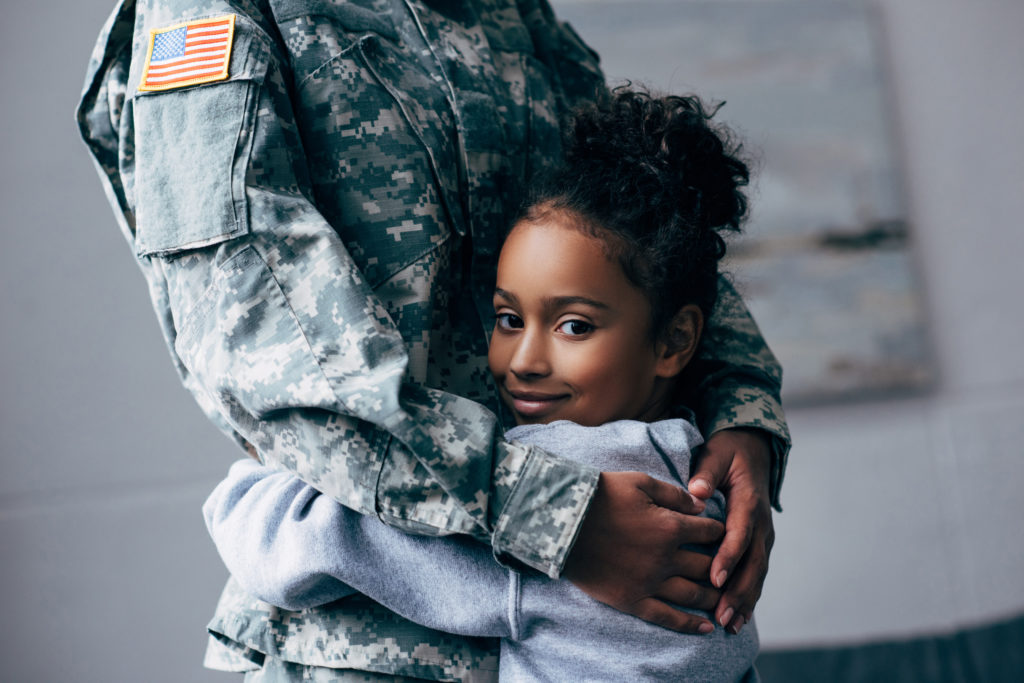Throughout CSSP’s Strengthening Families initiative, ZERO TO THREE has been a critical partner in supporting providers to take a strengths-based, protective factors approach to families with infants and toddlers. Today we welcome a guest blog post from Julia Yeary, LCSW, ACSW, IMH-E®, Director of Military Projects at ZERO TO THREE, whose work focuses on supporting military-connected families to build their protective factors. Julia will also be presenting on this topic for our December 13 Strengthening Families Networking Webinar.

For most military families, to be seen as having difficulty handling personal and family issues is to be seen as being weak. Perhaps that is why having a strengths-based approach in working with military families is so effective. In fact, the Department of Defense has adopted the Strengthening Families Protective Factors Framework as essential for their military home visitors.
Even outside of military installations and agencies, in any child- and family-serving agency you may be working with someone who is military connected and not even know it. Military families don’t always let others know about their military-connected identity, and many professionals who focus on the wellness of babies and toddlers may not know to ask. With an estimated 22 million veterans and active duty service members within the United States, chances are that about 8% of the families you serve are military-connected (Department of Veterans Affairs, 2017).

Why is it important to know whether the families you serve are military-connected? The same reason it is important to know about a family’s cultural identity! Military-connected families have a unique set of values and experiences that influence how they see the world. When you work to engage a family in your program, or think about how best to support them, knowing more about their culture and background makes it easier to honor their unique strengths and value their perspectives. It also is important to understand how the military experience might influence family dynamics and how this may affect parenting and the support children receive.
The challenges military-connected young children face are risk factors we can help parents prepare for by building upon their protective factors. Many military babies are born while their fathers are deployed or away for training. Many babies and toddlers grow up far away from important social connections (including their extended families) because of the constant relocation that is typical for military families. As a result, they don’t have grandpa and grandma to play with them regularly, or an aunt and uncle to help with child care. And, given the physical and psychological injuries that many service members have endured, some babies are born to mothers and fathers who are learning to parent at the same time that they’re learning to live with visible or invisible wounds. These are real challenges that military parents are keenly aware of.
Perhaps the best way to support and engage military-connected families with babies, toddlers, and older children, is to ensure we know about the rich traditions and complex culture, and robust protective factors service men and women possess. ZERO TO THREE has developed a variety of materials to support professionals in learning about the military and veteran family experience, as well as valuable resources that can be shared with both active duty and veteran families. Honoring Our Babies and Toddlers Professional Guide will help you better understand the unique challenges of parenting young children in the military; the app, Babies on the Homefront 2.0 will connect parents you serve to a variety of videos and articles to help promote parent-child connections and knowledge of child development. ZERO TO THREE has many more resources and articles filled with strategies for supporting military and veteran families with babies and toddlers, available in English and in Spanish. Learn more by joining the Strengthening Families Networking Webinar on December 13.
